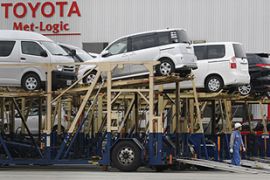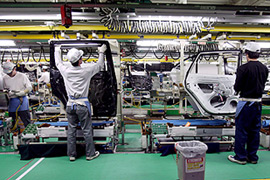Toyota gives $5bn loss warning
World’s biggest car manufacturer to declare worst annual results in its 70-year history.

It released its latest earnings data after the close of Friday’s trade on the Tokyo stock market.
Sharp downturn
For the year to March, Toyota officials said they are now predicting a loss of 450bn yen ($4.95bn), a sharp downturn from the 150bn yen loss forecast in December.
Toyota’s operating profit stood at 2.27 trillion yen ($24.98bn) a year earlier, but it is now struggling to cut production after years of building new plants to keep up with demand.
Like other Japanese car manufacturers, Toyota has been hit hard by the twin effects of the global slump set off by the US financial crisis combined with the rising value of the yen which has reduced overseas earnings.
Toyota shares have lost about half their value over the last year amid a plunge on the Tokyo stock market.
Plunging sales
Toyota replaced General Motors Corp for the first time in global vehicle sales, a position the American company had held for 77 years.
General Motors posted an 11 per cent drop in sales for the year, while Toyota sales fell four per cent.
 |
|
Toyota has moved to cut production to match slumping car sales worldwide [EPA] |
Car manufactuers around the world are enduring one of the worst periods in the history of the industry.
Consumers are shunning showrooms asd the fallout from the credit crunch and increasing job cuts takes its toll.
In anticipating the projected loss, Moody’s Investors gave Toyota a negative rating outlook, saying the downgrade was “driven by the significantly impaired state of profitability”.
Since its previous forecast in December, Toyota has announced additional reductions in production plans, but analysts say even those may not go far enough.
“The drop in global demand is growing more serious,” Shinya Naruse, auto analyst with Nomura Securities in Tokyo, said.
“It’s difficult to see when things are going to bottom out, and that’s why there’s no end yet to the rounds of production adjustments.”